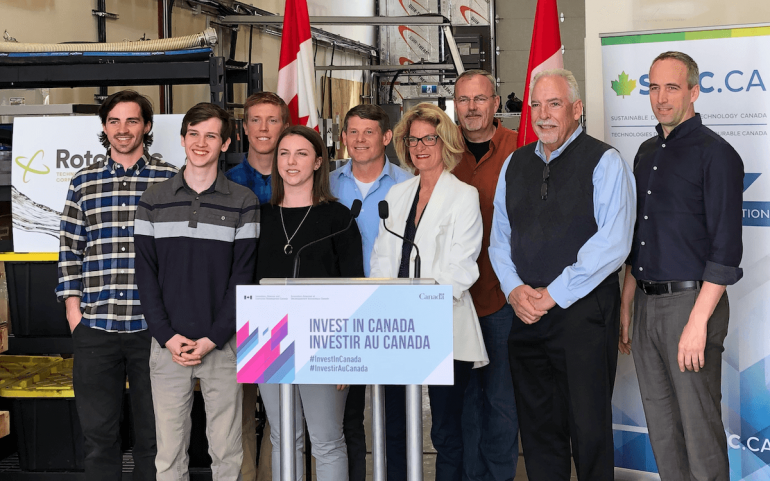Last week, several organizations received government funding for initiatives in cleantech, agri-tech, and healthtech, in all totaling $8.14 million.
Rotoliptic receives $2.89 million for pump technology
Rotoliptic Technologies Inc. received an investment of $2.89 million from the federal government, to support the development of its high-efficiency oil and gas pump technology.
The Rotoliptic pump consists of two parts, and was designed to simplify deployment, lower the cost of operation, and apply to a broad range of pumping needs. The company said it hopes to have its product ready for sale within the next two years, according to The Squamish Chief.
“Adoption of this technology will support the Canadian oil and gas sector’s leadership in cleantech.”
“Pumps use more electricity than any other piece of equipment in the oil and gas sector. Rotoliptic’s new pump design will reduce energy consumption by up to 40 percent,” said Leah Lawrence, president and CEO of Sustainable Development Technology Canada. “Adoption of this technology will support the Canadian oil and gas sector’s leadership in cleantech.”
Brendan Downes, executive chairman and CMO of Rotoliptic Technologies, said industrial pumping of fluids accounts for 20 percent of global electricity consumption and 5.6 percent of global greenhouse gas emissions.
“The revolutionary Rotoliptic pump architecture has the potential to reduce these numbers significantly,” Downes said. “This funding allows us to both expand our team and advance our technology towards commercialization.”
Rotoliptic Technologies is headquartered in Squamish, BC, with nine people currently on its team. CEO Adrian Corless told The Squamish Chief that the company plans to create six more jobs in the community, and will begin hiring immediately.
7D Surgical receives $1.8 million from FedDev Ontario
7D Surgical has received a $1.8 million investment from FedDev Ontario, to accelerate the commercialization of its machine vision surgical navigation technology, which can be used during spinal and cranial procedures.
7D Surgical Inc. has developed a Machine-Vision Image Guided Surgery (MvIGS) platform, what it calls the “7D Surgical System.” The system uses software algorithms and 3D imaging technology to give surgeons more accuracy in navigating the spine and brain, reducing operative times for patients. The system only uses light during the procedure, which eliminates exposure to harmful radiation for surgeons, hospital staff, and patients.
RELATED: VR could help treat Parkinson’s, schizophrenia, autism finds University of Waterloo report
“7D Surgical was developed in an academic setting with strong support from the federal government,” said Beau Standish, CEO of 7D Surgical. “With this significant FedDev Ontario support, our team can now enter the global stage and prove that southern Ontario is a market leader in medical device innovation.”
A statement from the government said this project will enable the company to launch new tools and features providing even more functionality to surgeons. In addition, 7D Surgical Inc. will allow the company to tap into new export markets, although those were not yet disclosed by the government.
UWinnipeg, JCA Electronics receive $3.45 million for digital agriculture projects
Two digital agriculture projects in Manitoba, the University of Winnipeg (UWinnipeg) and JCA Electronics, have received investments totalling $3.45 million from the federal government.
This $3.45 millon funding is part of Canada’s Innovation and Skills Plan, first announced in the 2017 federal budget.
The University of Winnipeg will receive $2.45 million to work in partnership with the Enterprise Machine Intelligence and Learning Initiative (EMILI) to promote machine learning and help build Manitoba’s digital agriculture industry. Winnipeg-based JCA Electronics will receive an investment of $1,000,000 to commercialize a tablet-based precision agriculture platform for farm operators. Its tablet has been designed to wirelessly manage implements for seeding, planting, and spraying applications in agriculture.
“Academic institutions like the University of Winnipeg, and companies like JCA Electronics are developing and delivering high tech, digital tools, and technologies that will better equip Canadian farmers as global leaders in the international ag-marketplace,” said Jim Carr, Minister of International Trade Diversification and Member of Parliament for Winnipeg South Centre.
The government said it expects the University of Winnipeg project will assist 165 SMEs. The federal government hopes to see JCA Electronics create 25 new jobs and an estimated $12.3 million in new incremental sales by the end of 2022.
“Manitoba’s agricultural industry is well positioned to seize global market opportunities through the design and adoption of digital technologies,” a statement from the government read.
Last December, Canada launched a funding competition for national scale initiatives in automation and digital technology applications in the agriculture and agri-food sector. Funding of between $10 and $50 million was committed for a successful applicant. The most recent funding is part of Canada’s Innovation and Skills Plan, first announced in the 2017 federal budget.


